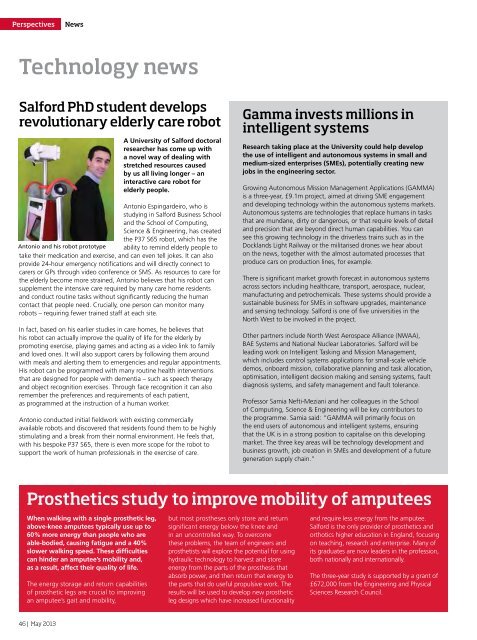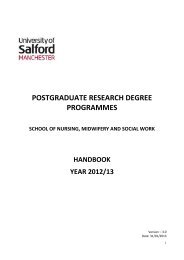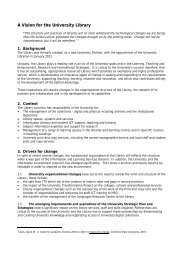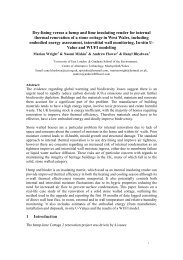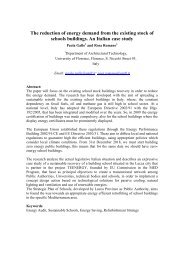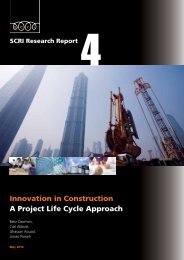Download a copy (pdf) - University of Salford
Download a copy (pdf) - University of Salford
Download a copy (pdf) - University of Salford
You also want an ePaper? Increase the reach of your titles
YUMPU automatically turns print PDFs into web optimized ePapers that Google loves.
PerspectivesNewsTechnology news<strong>Salford</strong> PhD student developsrevolutionary elderly care robotA <strong>University</strong> <strong>of</strong> <strong>Salford</strong> doctoralresearcher has come up witha novel way <strong>of</strong> dealing withstretched resources causedby us all living longer – aninteractive care robot forelderly people.Antonio Espingardeiro, who isstudying in <strong>Salford</strong> Business Schooland the School <strong>of</strong> Computing,Science & Engineering, has createdthe P37 S65 robot, which has theAntonio and his robot prototype ability to remind elderly people totake their medication and exercise, and can even tell jokes. It can alsoprovide 24-hour emergency notifications and will directly connect tocarers or GPs through video conference or SMS. As resources to care forthe elderly become more strained, Antonio believes that his robot cansupplement the intensive care required by many care home residentsand conduct routine tasks without significantly reducing the humancontact that people need. Crucially, one person can monitor manyrobots – requiring fewer trained staff at each site.In fact, based on his earlier studies in care homes, he believes thathis robot can actually improve the quality <strong>of</strong> life for the elderly bypromoting exercise, playing games and acting as a video link to familyand loved ones. It will also support carers by following them aroundwith meals and alerting them to emergencies and regular appointments.His robot can be programmed with many routine health interventionsthat are designed for people with dementia – such as speech therapyand object recognition exercises. Through face recognition it can alsoremember the preferences and requirements <strong>of</strong> each patient,as programmed at the instruction <strong>of</strong> a human worker.Antonio conducted initial fieldwork with existing commerciallyavailable robots and discovered that residents found them to be highlystimulating and a break from their normal environment. He feels that,with his bespoke P37 S65, there is even more scope for the robot tosupport the work <strong>of</strong> human pr<strong>of</strong>essionals in the exercise <strong>of</strong> care.Gamma invests millions inintelligent systemsResearch taking place at the <strong>University</strong> could help developthe use <strong>of</strong> intelligent and autonomous systems in small andmedium-sized enterprises (SMEs), potentially creating newjobs in the engineering sector.Growing Autonomous Mission Management Applications (GAMMA)is a three-year, £9.1m project, aimed at driving SME engagementand developing technology within the autonomous systems markets.Autonomous systems are technologies that replace humans in tasksthat are mundane, dirty or dangerous, or that require levels <strong>of</strong> detailand precision that are beyond direct human capabilities. You cansee this growing technology in the driverless trains such as in theDocklands Light Railway or the militarised drones we hear abouton the news, together with the almost automated processes thatproduce cars on production lines, for example.There is significant market growth forecast in autonomous systemsacross sectors including healthcare, transport, aerospace, nuclear,manufacturing and petrochemicals. These systems should provide asustainable business for SMEs in s<strong>of</strong>tware upgrades, maintenanceand sensing technology. <strong>Salford</strong> is one <strong>of</strong> five universities in theNorth West to be involved in the project.Other partners include North West Aerospace Alliance (NWAA),BAE Systems and National Nuclear Laboratories. <strong>Salford</strong> will beleading work on Intelligent Tasking and Mission Management,which includes control systems applications for small-scale vehicledemos, onboard mission, collaborative planning and task allocation,optimisation, intelligent decision making and sensing systems, faultdiagnosis systems, and safety management and fault tolerance.Pr<strong>of</strong>essor Samia Nefti-Meziani and her colleagues in the School<strong>of</strong> Computing, Science & Engineering will be key contributors tothe programme. Samia said: “GAMMA will primarily focus onthe end users <strong>of</strong> autonomous and intelligent systems, ensuringthat the UK is in a strong position to capitalise on this developingmarket. The three key areas will be technology development andbusiness growth, job creation in SMEs and development <strong>of</strong> a futuregeneration supply chain.”Prosthetics study to improve mobility <strong>of</strong> amputeesWhen walking with a single prosthetic leg,above-knee amputees typically use up to60% more energy than people who areable-bodied, causing fatigue and a 40%slower walking speed. These difficultiescan hinder an amputee’s mobility and,as a result, affect their quality <strong>of</strong> life.The energy storage and return capabilities<strong>of</strong> prosthetic legs are crucial to improvingan amputee’s gait and mobility,but most prostheses only store and returnsignificant energy below the knee andin an uncontrolled way. To overcomethese problems, the team <strong>of</strong> engineers andprosthetists will explore the potential for usinghydraulic technology to harvest and storeenergy from the parts <strong>of</strong> the prosthesis thatabsorb power, and then return that energy tothe parts that do useful propulsive work. Theresults will be used to develop new prostheticleg designs which have increased functionalityand require less energy from the amputee.<strong>Salford</strong> is the only provider <strong>of</strong> prosthetics andorthotics higher education in England, focusingon teaching, research and enterprise. Many <strong>of</strong>its graduates are now leaders in the pr<strong>of</strong>ession,both nationally and internationally.The three-year study is supported by a grant <strong>of</strong>£672,000 from the Engineering and PhysicalSciences Research Council.46 | May 2013


